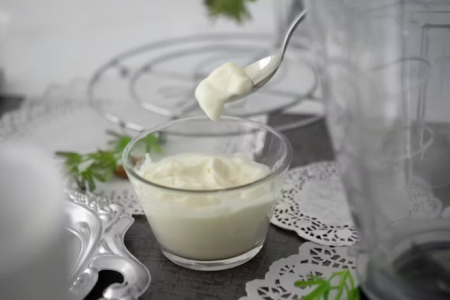A simple yogurt add-in could do wonders for your gut—here’s what to know
- Replies 0
It’s the kind of breakfast combination you’ve probably eaten a dozen times without giving it much thought.
But new research suggests there’s more happening in that bowl than just a morning snack.
And the surprising part? The secret boost to your digestion might already be sitting in your kitchen.
One small addition could be giving your gut bacteria a serious advantage—without you even knowing it.
A group of researchers recently took a closer look at what happens when a well-loved sweetener is mixed with a common probiotic food.
The team focused on yogurt, known for containing Bifidobacterium animalis and other gut-supporting microbes.
Yogurt alone already provides digestive and cognitive benefits—but those benefits are only useful if the microbes survive the trip through your body.

Yogurt alone already provides digestive and cognitive benefits—but those benefits are only useful if the microbes survive the trip through your body. Image source: Sara Cervera / Unsplash
Your digestive system breaks down food using enzymes, stomach acids, and bile salts.
Unfortunately, those same processes can wipe out probiotics before they reach the intestines.
The question researchers asked: could a natural sweetener help these beneficial bacteria stay alive long enough to help your gut?
To find out, the researchers ran two separate studies—one in a lab, and one in real life.
They tested four different types of honey: alfalfa, buckwheat, clover, and orange blossom.
Each was added to yogurt containing B. animalis, and exposed to fluids that mimic digestion, from saliva to stomach acid to bile.
They found that honey didn’t do much during the early stages of digestion.
The bacteria didn’t survive any better in saliva or stomach acid, regardless of the honey type.
But once the yogurt hit the simulated intestines, things changed—especially with clover honey.
Clover honey was linked to much higher probiotic survival rates in the intestinal stage.
That means more good bacteria had a chance to reach the colon where they could do some real work.
Based on this, the researchers moved on to a human trial to see if the results would hold up.
They recruited 66 healthy adults and had them eat yogurt with and without clover honey over two weeks. Each person tried both versions at different times.
To test the results, the researchers used stool samples, surveys, and tasks designed to assess mood and cognition.
There weren’t major changes in gut movement, mood, or cognitive scores between the two yogurt versions.
But again—these were healthy adults, so there wasn’t much room for improvement to begin with.
Still, they noticed something important: the yogurt and honey combo consistently helped probiotics survive better through the digestive tract.
That wasn’t all.
A second mini-study was done using yogurt with regular sugar.
Even then, the honey version outperformed the sugar one when it came to preserving probiotics.
That gave the team even more confidence in what they had observed.
One tablespoon of clover honey added to unsweetened yogurt may make all the difference.
According to one of the researchers, “Yogurt is a nice culinary pairing to incorporate into your menu rotation.”
The key takeaway isn’t about eliminating sugar completely—it’s about choosing the right type in the right quantity.
Honey has been part of the Mediterranean diet for centuries, and the new findings suggest that tradition has some science behind it.
For those watching their sugar intake, it’s still important to be mindful.
But one tablespoon of honey isn’t likely to tip the scale, especially if the tradeoff is more active and resilient gut microbes.
The study didn’t show major changes in mood or bathroom habits, but gut health is a long game.
Giving your digestive system extra support may help with everything from nutrient absorption to immune balance down the line.
The research didn’t focus on older adults specifically. Still, yogurt and honey may be a smart, low-effort way to maintain gut balance—especially for those 50 and older.
The team didn’t test whether this effect holds for every brand or type of yogurt, so it’s best to stick to plain options with live cultures.
Sweeten it yourself with a drizzle of clover honey rather than buying flavored varieties.
Researchers will likely continue exploring how food pairings can make probiotics more effective.
For now, the results suggest that what you add to your yogurt could be just as important as the yogurt itself.

Have you tried pairing honey with yogurt in your breakfast routine? Do you think small changes like this could really make a difference for your gut health? Or do you have your own gut-friendly food hacks to share with the GrayVine community? Let us know in the comments—we always love hearing what’s working for you.
But new research suggests there’s more happening in that bowl than just a morning snack.
And the surprising part? The secret boost to your digestion might already be sitting in your kitchen.
One small addition could be giving your gut bacteria a serious advantage—without you even knowing it.
A group of researchers recently took a closer look at what happens when a well-loved sweetener is mixed with a common probiotic food.
The team focused on yogurt, known for containing Bifidobacterium animalis and other gut-supporting microbes.
Yogurt alone already provides digestive and cognitive benefits—but those benefits are only useful if the microbes survive the trip through your body.

Yogurt alone already provides digestive and cognitive benefits—but those benefits are only useful if the microbes survive the trip through your body. Image source: Sara Cervera / Unsplash
Your digestive system breaks down food using enzymes, stomach acids, and bile salts.
Unfortunately, those same processes can wipe out probiotics before they reach the intestines.
The question researchers asked: could a natural sweetener help these beneficial bacteria stay alive long enough to help your gut?
To find out, the researchers ran two separate studies—one in a lab, and one in real life.
They tested four different types of honey: alfalfa, buckwheat, clover, and orange blossom.
Each was added to yogurt containing B. animalis, and exposed to fluids that mimic digestion, from saliva to stomach acid to bile.
They found that honey didn’t do much during the early stages of digestion.
The bacteria didn’t survive any better in saliva or stomach acid, regardless of the honey type.
But once the yogurt hit the simulated intestines, things changed—especially with clover honey.
Clover honey was linked to much higher probiotic survival rates in the intestinal stage.
That means more good bacteria had a chance to reach the colon where they could do some real work.
Based on this, the researchers moved on to a human trial to see if the results would hold up.
They recruited 66 healthy adults and had them eat yogurt with and without clover honey over two weeks. Each person tried both versions at different times.
To test the results, the researchers used stool samples, surveys, and tasks designed to assess mood and cognition.
There weren’t major changes in gut movement, mood, or cognitive scores between the two yogurt versions.
But again—these were healthy adults, so there wasn’t much room for improvement to begin with.
Still, they noticed something important: the yogurt and honey combo consistently helped probiotics survive better through the digestive tract.
That wasn’t all.
A second mini-study was done using yogurt with regular sugar.
Even then, the honey version outperformed the sugar one when it came to preserving probiotics.
That gave the team even more confidence in what they had observed.
One tablespoon of clover honey added to unsweetened yogurt may make all the difference.
According to one of the researchers, “Yogurt is a nice culinary pairing to incorporate into your menu rotation.”
The key takeaway isn’t about eliminating sugar completely—it’s about choosing the right type in the right quantity.
Honey has been part of the Mediterranean diet for centuries, and the new findings suggest that tradition has some science behind it.
For those watching their sugar intake, it’s still important to be mindful.
But one tablespoon of honey isn’t likely to tip the scale, especially if the tradeoff is more active and resilient gut microbes.
The study didn’t show major changes in mood or bathroom habits, but gut health is a long game.
Giving your digestive system extra support may help with everything from nutrient absorption to immune balance down the line.
The research didn’t focus on older adults specifically. Still, yogurt and honey may be a smart, low-effort way to maintain gut balance—especially for those 50 and older.
The team didn’t test whether this effect holds for every brand or type of yogurt, so it’s best to stick to plain options with live cultures.
Sweeten it yourself with a drizzle of clover honey rather than buying flavored varieties.
Researchers will likely continue exploring how food pairings can make probiotics more effective.
For now, the results suggest that what you add to your yogurt could be just as important as the yogurt itself.
Key Takeaways
- Researchers found that clover honey added to yogurt helped more probiotic bacteria survive the digestive process.
- The study showed no probiotic survival benefits in early digestion stages but significant improvement in the intestinal phase.
- A follow-up clinical trial confirmed better probiotic survival when participants consumed yogurt with clover honey compared to yogurt alone or yogurt with sugar.
- Experts recommend adding one tablespoon of clover honey to plain yogurt to help preserve beneficial microbes.






